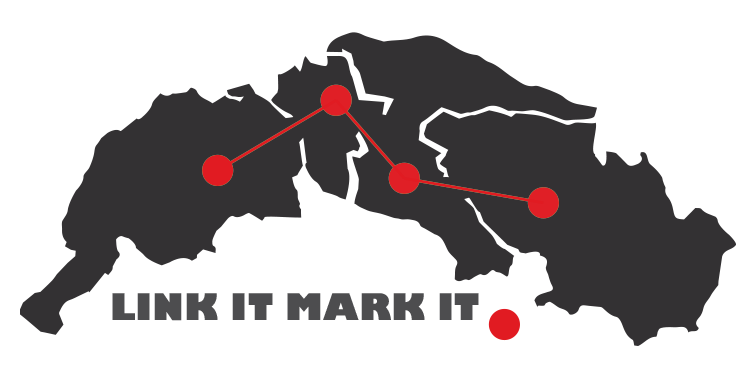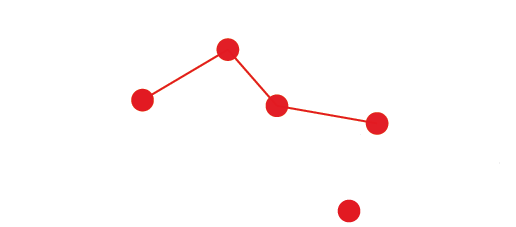About the project
Link It, Mark It project
Union of Fine Artists’ Association of Vojvodina
Artist-in-Residence Programme
In the last few years, in addition to the regular activities that have been traditionally taking place for a number decades, the Union of Fine Artists’ Associations of Vojvodina has launched several new projects primarily aimed at: development and advancement of support in production of works, exchange and guest appearances of artists, international and regional cooperation and networking, education and launching thematic units and concepts that develop an exploratory approach to participation in projects.
One of the development projects of the Union of Fine Artists’ Associations of Vojvodina taking place through the Artist-in-Residence Programme is Link It, Mark It, which opens door to a new field of programming content. The project was included in the European Capital of Culture application book and its implementation enjoys the support of the “Novi Sad 2021 – European Capital of Culture” Foundation within its programme arch Migration, and has been supported by the Serbian Open Society Foundation and the City Administration for Culture of Novi Sad.
The programming activities of the Link It, Mark It project are aimed to initiate a specific process of interconnecting and integrating guest and local artists. The emphasis is on networking, international cooperation and exchange of artistic ideas and experiences. The Union of Fine Artists’ Associations of Vojvodina thus improves the existing and initiates new types of cooperation with various associations, artistic groups and individuals from our country and abroad. The conceptual idea of the Link It, Mark It project includes exploring spatial, media, socio-political and societal aspects to be presented in the artistic works. In that context, we are looking into the possibilities of activating new, alternative exhibition spaces in different locations of the city.
The development idea of the project is: networking of multimedia artists; building regional and international connections; development and growth of the artistic community’s the capacities; establishing cooperation between associations and organisations; initiating intercultural dialogues; research and experimentation in the field of multimedia forms; development of thematic content and concepts; activating new, i.e., alternative and already existing exhibition spaces; artists’ guest appearances and presentation of artworks by individual authors and groups.
The Project Theme – ERASED
he concept and topic of the project rely on the notion of ERASED, which refers to the 1990s and various forms of discrimination that the civil society was exposed to by the state through its institutions. The notion erased envelops various repressive practices, discrimination based on ethnic, religious, gender, age, race, economic and other affiliations. The obliteration of individual identity was reflected in: denying the right to citizenship, erasing from various records, denying voting rights, forced migration, seeking refuge, expatriation, displacement. In this sense, the project’s thematic framework simultaneously speaks of the lost identities and lost generations, associated mainly with people born in this region between 1960 and 1985 according to some analyses and research. These are the generations who lost their homeland, place of residence, jobs, properties, citizenship, personal and social integrity, whose fundamental human rights, which should have been guaranteed and inviolable by the Universal Declaration of Human Rights and the European Convention on Human Rights, were violated. These, mostly irretrievable losses underscore a particular, although rarely recognised consequence – lost youth, together with post-effects of growing up and becoming an adult in the specific circumstances surrounding them during the 1990s, which are, more or less, still manifest today. Having borne witness to the violation of the basic principles of civilisation, these generations, due to the disintegration of SFRY and years marked by military conflicts, sanctions and economic and cultural isolation, even later in the transition period, were labelled as generations left to chance.
The theme ERASED emphasizes the specific socio-political context in which generations of artists matured professionally during the 1990s, and their artistic practice coincides temporally and thematically with experiences and events in the mentioned period and extends into present time. The concept of the project opens a field for new explorations where, general issues of spatial, temporal and social circumstances in the region are tackled through activism, democratisation and the culture of remembrance.

Public discussions – The first part of the project was actualised through four public discussions with authors-participants.
Erased / period of the 1990s
Discussions I–III / Focusing on the theme ERASED, the discussions attempted to explore and re-examine social phenomena of the 1990s in Southeast Europe and their effects on the artistic creative practices. Active participation included hosting, moderating and presenting two artists born between 1960 and 1985. The exploration refers to the thematic context and the spatial, media, socio-political and societal aspects of understanding this issue.
The discussions were held: on 18th December 2020, 9th and 16th April 2021, with participation of guest artists (Vladimir Frelih, Osijek, Croatia; Arjan Pregl, Ljubljana, Slovenia; Igor Fridrih Petković, Graz, Austria), domestic artists (Dragan Matić, Novi Sad, Serbia; Danijel Babić, Novi Sad, Serbia; Selman Trtovac, Belgrade, Serbia) and moderators (Vladimir Mitrović, Novi Sad, Serbia; Bosiljka Zirojević Lečić, Novi Sad, Serbia; Gordana Nonin, Novi Sad, Serbia).
Erased / global migrations today
Discussion IV / Besides re-examination of social events and their impact on artistic creation, the topic was opened of global migration today and issues of violations of human rights of migrants and their families, endangering their life or physical integrity, seeking refuge from war conflicts/economic insecurity, as well as the question of how these reflect on contemporary art.
The discussion was held on 14th May 2021, where the moderator (Igor Fridrih Petković, Graz, Austria) talked with the authors Maryam Mohammadi, Zoë Guglielmi, Arif Kryeziu, Mawiead Al Karam and Samson Ogiamien, who have emigrated from certain territories, about, among other things, solving their immigration status. The discussion tackled the issues of contemporary large scale migrations and their influence on creative practices of artists who have migrated and had an asylum seeker status.
Artistic research – The second part of the project
After completing preparatory activities, the project participants are joined in their network by authors from the younger generation. They exchange experiences and knowledge gained through the research with them. In this way, networking and establishing regional and international links contributes to developing the capacity of the artistic community, and the network thus made supports the sustainability of certain cultural values. The results of these explorations will be reflected in distinctive authorial iconography of all project participants as well as the team work of the participating authors who will present their works in the final event of the project, which will be held in 2022 – the year when Novi Sad is to bear the title of the European Capital of Culture.

The closing event in 2022
During the period of their stay in Novi Sad, the guest artists will have the opportunity to get to know, analyse and make interventions in the local context, on the city’s cultural scene, in co-production with the host artists. Through their activities, they will jointly contribute to a new experience and fusion of their own, authentic work with the contemporary values of the local environment and the thematic framework of the project. On that occasion, the project research will be presented through the several exhibitions in Novi Sad.

